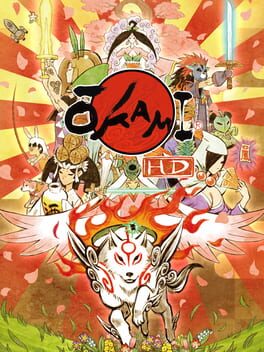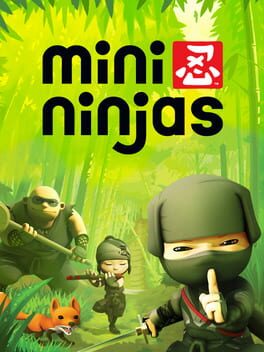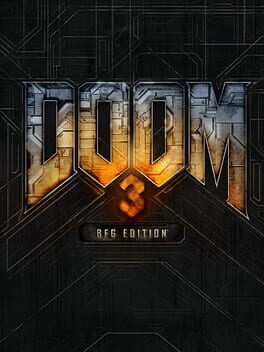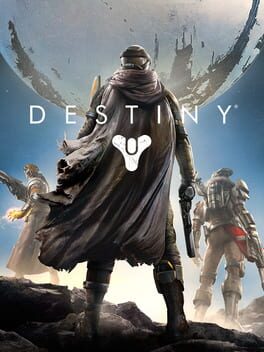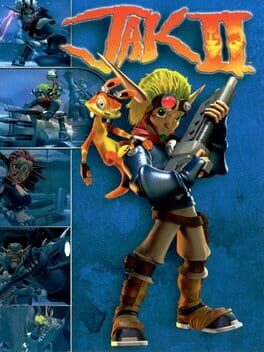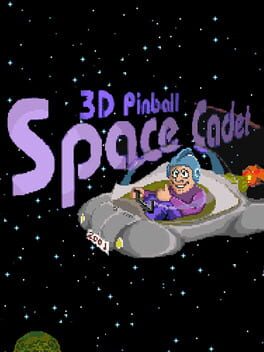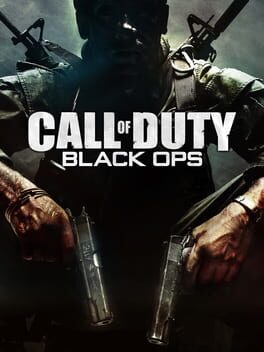Nazo_KG
2012
2009
2012
2014
2003
2022
A short narrative revolving around sentient fish that questions your tenacity in decision-making, and contemplates the power that our choices can have, or lack thereof.
Excellent sound design, low-poly art direction allows your imagination to fill in the blanks. At some points, it genuinely made me feel sick to my stomach.
How Fish Is Made is disgusting, horrific and absolutely brilliant. I love it.
Excellent sound design, low-poly art direction allows your imagination to fill in the blanks. At some points, it genuinely made me feel sick to my stomach.
How Fish Is Made is disgusting, horrific and absolutely brilliant. I love it.
2011
2004
A masterclass in "show don't tell", as well as being one of the first instances of video games as an art form, Yume Nikki is nothing short of unique, eccentric and subtly horrifying.
It isn't a game that everyone will enjoy, and will ask of you your patience.
The areas seem random and incoherent at first, but as you explore more and more of the game, you will start to read into Madotsuki, the girl that you as the player take charge of.
On the surface, Yume Nikki delves into the same subjects as the Surrealist-era artists did; ephemeral and strange dream-like imagery and objects.
Underneath the quirky and random nature of this title lies a dark and legitimately unsettling "true self" that the game keeps from you at first.
Its pseudo-spontaneous nature lends itself to the fact that each person that plays this game will have a different experience with it, some very very personal.
There aren't many games that made me feel what Yume Nikki made me feel; and for a game with little dialogue, if any, it made me feel emotionally attached to a character by simply having me walk with them through their memories and their mind.
Yume Nikki is not a good game in the traditional sense of the medium, but it is an enlightening experience and has the ability to connect with people through emotional, and what could be almost considered spiritual means.
I used to often play this game at a time when I was struggling with my own mental health and trying to navigate life.
Since then, I've played many more games that I've truly connected with but Yume Nikki never really left my mind.
Thank you, Kikiyama.
It isn't a game that everyone will enjoy, and will ask of you your patience.
The areas seem random and incoherent at first, but as you explore more and more of the game, you will start to read into Madotsuki, the girl that you as the player take charge of.
On the surface, Yume Nikki delves into the same subjects as the Surrealist-era artists did; ephemeral and strange dream-like imagery and objects.
Underneath the quirky and random nature of this title lies a dark and legitimately unsettling "true self" that the game keeps from you at first.
Its pseudo-spontaneous nature lends itself to the fact that each person that plays this game will have a different experience with it, some very very personal.
There aren't many games that made me feel what Yume Nikki made me feel; and for a game with little dialogue, if any, it made me feel emotionally attached to a character by simply having me walk with them through their memories and their mind.
Yume Nikki is not a good game in the traditional sense of the medium, but it is an enlightening experience and has the ability to connect with people through emotional, and what could be almost considered spiritual means.
I used to often play this game at a time when I was struggling with my own mental health and trying to navigate life.
Since then, I've played many more games that I've truly connected with but Yume Nikki never really left my mind.
Thank you, Kikiyama.
It must be some kind of a sick joke that this game from 2006, not developed by Game Freak, manages to get accurate sizes for Pokémon and proper attack alignment for moves like Flamethrower and Hydro Cannon so you don't get stupid nonsense like Blastoise shooting water from its belly.
Meanwhile, in 2022, Game Freak pretends to be an indie game studio and can't even put out a functional game for a multi-million dollar franchise.
Meanwhile, in 2022, Game Freak pretends to be an indie game studio and can't even put out a functional game for a multi-million dollar franchise.
2016
Truly one of those games that you'll either love or hate.
I can't bring myself to dislike any of Team Ico's games, as what they bring to the table is very important in the landscape of what video games are, could be, and will be. They are the quintessential examples of video games as artistic monuments, and as such, it will divide a lot of people.
Games such as Yume Nikki are viewed the same way; for some, it's almost akin to a spiritual awakeneing, to others it's a boring walking simulator.
If you go into these games with the mindset of expecting a normal "gamey" video game, you're setting yourself up to get disappointed.
But if you open yourself to what the creative minds behind these projects were trying to achieve, you'll see the awe and wonder that captured so many folks' imaginations.
None of the Team Ico games were ever about being a good video game.
But to me, the weight of the narrative, emotion and genuine ambition that these game carry is something so visceral, so conductive that I can't help but fall in love with them.
Such is the case too with The Last Guardian, where you assume the role of a small boy befriending a giant chimera-esque creature called Trico, and follow their journey.
Trico behaves like a real animal; it won't always listen to you, and it won't follow your orders exactly like you want it to. And for some, that alone turned them off this title, but there is something to be said about the obtuse nature of this mechanism and how life-like it feels at times.
And to me, that cements itself as a bold, innovative attempt instead of a mistake.
The story told in the game is perfectually gradual, and over the course of the game, as you overcome hardships and spend time getting acquainted with Trico, you develop a heartfelt bond with it.
The story's conclusion also subverts expectations, all I can say without spoiling it.
The environmental storytelling in Team Ico games is something so fundamentally unique and otherworldly that I feel it cannot be replicated in any other games.
The same barren, desolate and haunting abandoned structures of old that appears in the previous Team Ico games makes a return, and it is just as poignantly beautiful as ever in The Last Guardian.
The thing I always liked about these environment designs is, they make you ask questions, and wonder about them.
Who lived here? Who were they? Who made these colossal structures? HOW did they make these structures? What happened to them? What was the downfall that led to this?
I'll always think the environmental design in Team Ico games is genius, because it rarely ever gives you the answers you so desire, but the truth is, you don't need them.
So many aspects of these games are steeped in mystery that unveiling everything to the player would ruin the important aspect of enthralling you with asking yourself what YOU think may have happened, and interpreting it as you see it.
As I said before, Team Ico games are, first and foremost, art pieces. In my eyes, at least. And despite them not being "very good" video games, they're extraordinary art pieces that stand on their own as examples of fantastic ethereal storytelling experiences that have something of value to show you.
You wouldn't be able to get the same experience out of it if it was a movie.
I think the adversity of the obtuse game design adds a layer of authenticity to the whole thing, in a way.
I love The Last Guardian despite all its flaws, there's no other thing out there quite like this earnest hard-won effort from Team Ico.
It's heartfelt, down to earth and moving.
I can't bring myself to dislike any of Team Ico's games, as what they bring to the table is very important in the landscape of what video games are, could be, and will be. They are the quintessential examples of video games as artistic monuments, and as such, it will divide a lot of people.
Games such as Yume Nikki are viewed the same way; for some, it's almost akin to a spiritual awakeneing, to others it's a boring walking simulator.
If you go into these games with the mindset of expecting a normal "gamey" video game, you're setting yourself up to get disappointed.
But if you open yourself to what the creative minds behind these projects were trying to achieve, you'll see the awe and wonder that captured so many folks' imaginations.
None of the Team Ico games were ever about being a good video game.
But to me, the weight of the narrative, emotion and genuine ambition that these game carry is something so visceral, so conductive that I can't help but fall in love with them.
Such is the case too with The Last Guardian, where you assume the role of a small boy befriending a giant chimera-esque creature called Trico, and follow their journey.
Trico behaves like a real animal; it won't always listen to you, and it won't follow your orders exactly like you want it to. And for some, that alone turned them off this title, but there is something to be said about the obtuse nature of this mechanism and how life-like it feels at times.
And to me, that cements itself as a bold, innovative attempt instead of a mistake.
The story told in the game is perfectually gradual, and over the course of the game, as you overcome hardships and spend time getting acquainted with Trico, you develop a heartfelt bond with it.
The story's conclusion also subverts expectations, all I can say without spoiling it.
The environmental storytelling in Team Ico games is something so fundamentally unique and otherworldly that I feel it cannot be replicated in any other games.
The same barren, desolate and haunting abandoned structures of old that appears in the previous Team Ico games makes a return, and it is just as poignantly beautiful as ever in The Last Guardian.
The thing I always liked about these environment designs is, they make you ask questions, and wonder about them.
Who lived here? Who were they? Who made these colossal structures? HOW did they make these structures? What happened to them? What was the downfall that led to this?
I'll always think the environmental design in Team Ico games is genius, because it rarely ever gives you the answers you so desire, but the truth is, you don't need them.
So many aspects of these games are steeped in mystery that unveiling everything to the player would ruin the important aspect of enthralling you with asking yourself what YOU think may have happened, and interpreting it as you see it.
As I said before, Team Ico games are, first and foremost, art pieces. In my eyes, at least. And despite them not being "very good" video games, they're extraordinary art pieces that stand on their own as examples of fantastic ethereal storytelling experiences that have something of value to show you.
You wouldn't be able to get the same experience out of it if it was a movie.
I think the adversity of the obtuse game design adds a layer of authenticity to the whole thing, in a way.
I love The Last Guardian despite all its flaws, there's no other thing out there quite like this earnest hard-won effort from Team Ico.
It's heartfelt, down to earth and moving.
2017
Hauntingly beautiful, poignant and masterful; Hollow Knight is an exemplary title that is greater than the sum of its parts.
Being made by only a handful of people, it is really impressive just how much care and precision was given to almost every part of the game.
The unique hand-drawn art style brings the world of Hallownest to life in all its morbid, dark, depressing and yet beguilling glory, accompanied by one of the most heart-wrenching and breath-taking soundtracks I've ever had the pleasure of experiencing in a video game, let alone creative media.
It has many merits, among which is bringing you into an eccentric universe of insects and monsters, underlined with a tale of desolate ruin of a forlorn regal background.
It manages to be as much sinister and melancholic as it is elegant and graceful, and I think that is exactly what Hollow Knight encompasses as a whole.
All of this is melded seamlessly with a control scheme and gameplay that is fine-tuned and precise to a T, yet deceptively simple and easy to understand.
And while your skills will be tested, you have many options and paths to fall back upon even if at first you do not succeed.
Hollow Knight is a challenging title, to say the least. The debate of it being a Souls-like is not without reason, putting aside the similar aesthetic/setting motifs.
I wasn't able to complete every quest in the game, but I think it is noteworthy to point out that there is an astounding amount of content in the game, even looking past the main story goal. For those thirsting for a true challenge, there is a wealth of battles to test your mettle against, and even more secrets to uncover.
My only true complaint about Hollow Knight is the amount of backtracking you have to do at certain points, since when you die, you are brought back to the last save point - the humble dark-toned metal benches- scattered around the world.
My one issue is that boss arenas rarely ever have a checkpoint/bench in front of them and that backtracking to attempt the fight again constantly is pointless and rather annoying. If that were fixed, I'd have no other issues with this game.
Hollow Knight isn't a game for everyone. Its difficulty alone will scare off some people.
But for those who delve deep into its trove of secrets and lend it their patience, there is an incredible, unforgettable experience awaiting to spill its heart out to you.
Being made by only a handful of people, it is really impressive just how much care and precision was given to almost every part of the game.
The unique hand-drawn art style brings the world of Hallownest to life in all its morbid, dark, depressing and yet beguilling glory, accompanied by one of the most heart-wrenching and breath-taking soundtracks I've ever had the pleasure of experiencing in a video game, let alone creative media.
It has many merits, among which is bringing you into an eccentric universe of insects and monsters, underlined with a tale of desolate ruin of a forlorn regal background.
It manages to be as much sinister and melancholic as it is elegant and graceful, and I think that is exactly what Hollow Knight encompasses as a whole.
All of this is melded seamlessly with a control scheme and gameplay that is fine-tuned and precise to a T, yet deceptively simple and easy to understand.
And while your skills will be tested, you have many options and paths to fall back upon even if at first you do not succeed.
Hollow Knight is a challenging title, to say the least. The debate of it being a Souls-like is not without reason, putting aside the similar aesthetic/setting motifs.
I wasn't able to complete every quest in the game, but I think it is noteworthy to point out that there is an astounding amount of content in the game, even looking past the main story goal. For those thirsting for a true challenge, there is a wealth of battles to test your mettle against, and even more secrets to uncover.
My only true complaint about Hollow Knight is the amount of backtracking you have to do at certain points, since when you die, you are brought back to the last save point - the humble dark-toned metal benches- scattered around the world.
My one issue is that boss arenas rarely ever have a checkpoint/bench in front of them and that backtracking to attempt the fight again constantly is pointless and rather annoying. If that were fixed, I'd have no other issues with this game.
Hollow Knight isn't a game for everyone. Its difficulty alone will scare off some people.
But for those who delve deep into its trove of secrets and lend it their patience, there is an incredible, unforgettable experience awaiting to spill its heart out to you.
2012
I've heard this game described before as a 'playable anime', and honestly? It's a very fitting moniker for Asura's Wrath.
It has the energy of a title made by Platinum games, minus the gameplay depth/innovation you'd expect from them.
The fight scenes are huge and exaggerated, with focus on cinematic camera angles. The character designs are bold and memorable, with inspiration from Buddhist and Hindu mythology.
The art style is also quite unique with a cel shaded, almost cross-hatched look to the characters. I really loved seeing the characters in action doing crazy moves and transforming, it's all so over the top yet awesome.
The music is fitting towards the feel of the game and grand nature of it, but the way it used to convey emotion and accentuate the mood is impressive.
and the game is played in episodes; you'll frequently get recaps on the story akin to the ones you'd get in anime.
The story itself has a fairly interesting premise, where divine beings backdropped against advanced technology fight the evil spirits of the Earth, essentially. Without going into spoilers, the main story actually focuses on Asura's path to get revenge against those who have wronged him.
It's a fairly straightforward story with one or two twists, but the presentation itself is what makes it so special.
I think the pieces to make this game a masterpiece akin in quality to something like Metal Gear Rising are there, but it just doesn't quite reach it.
The game's combat system is rather mindless and shallow, and this is the one thing apart from very noticable performance issues that bring this game down for me.
You'll mostly just be mashing the same buttons over and over in the fights, and in a game where almost everything else seems to have such a high level of polish, this is kind of a bafflingly important aspect of the game that seems to be overlooked.
Other the actual combat, the game is dotted with quicktime events and rail shooter segments that are implemented into the episodes that the game is split into.
Although quick time events are frowned upon these days, I think their use in this game is actually quite good, and doesn't detract from the quality of the game.
Asura's Wrath is still a unique and enthralling title, greater than the sum of its parts, and had a novel idea at its core.
It has the energy of a title made by Platinum games, minus the gameplay depth/innovation you'd expect from them.
The fight scenes are huge and exaggerated, with focus on cinematic camera angles. The character designs are bold and memorable, with inspiration from Buddhist and Hindu mythology.
The art style is also quite unique with a cel shaded, almost cross-hatched look to the characters. I really loved seeing the characters in action doing crazy moves and transforming, it's all so over the top yet awesome.
The music is fitting towards the feel of the game and grand nature of it, but the way it used to convey emotion and accentuate the mood is impressive.
and the game is played in episodes; you'll frequently get recaps on the story akin to the ones you'd get in anime.
The story itself has a fairly interesting premise, where divine beings backdropped against advanced technology fight the evil spirits of the Earth, essentially. Without going into spoilers, the main story actually focuses on Asura's path to get revenge against those who have wronged him.
It's a fairly straightforward story with one or two twists, but the presentation itself is what makes it so special.
I think the pieces to make this game a masterpiece akin in quality to something like Metal Gear Rising are there, but it just doesn't quite reach it.
The game's combat system is rather mindless and shallow, and this is the one thing apart from very noticable performance issues that bring this game down for me.
You'll mostly just be mashing the same buttons over and over in the fights, and in a game where almost everything else seems to have such a high level of polish, this is kind of a bafflingly important aspect of the game that seems to be overlooked.
Other the actual combat, the game is dotted with quicktime events and rail shooter segments that are implemented into the episodes that the game is split into.
Although quick time events are frowned upon these days, I think their use in this game is actually quite good, and doesn't detract from the quality of the game.
Asura's Wrath is still a unique and enthralling title, greater than the sum of its parts, and had a novel idea at its core.
